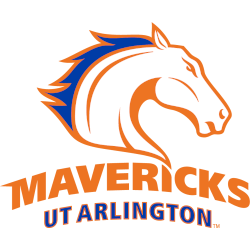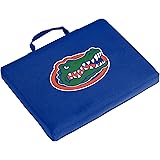
College Sports Established
1895
Location
Arlington, Texas
College Name
University of Texas at Arlington
Collegiate History
1973 - Present / NCAA Division I
1963 - 1973 / University Division of the NCAA
Conference History
2012, 2022 - Present / Western Athletic Conference
2013 - 2022 / Sun Belt Conference
1963 - 2012 / Southland Conference
Nickname
Mavericks - The University of Texas at Arlington Mavericks has proudly represented their school since 1959. But where did the name come from? It turns out that the origin of this iconic nickname is a bit more complex than you may think!
It all started in 1958 when UT-Arlington sought a new mascot to represent them. The university had already used several animal mascots, including owls and rams, but they wanted something unique and powerful to help set them apart from other schools. After much debate among students, faculty members, alumni, and administrators and suggestions from local newspapers, it was decided that “Mavericks” would be the perfect fit for UT-Arlington's new mascot.
The term "maverick" originates from 1845 when Samuel Augustus Maverick refused to brand his cattle with any particular mark or symbol - thus making him an independent thinker who didn't follow traditional rules or conventions like everyone else! This idea resonated with those involved in choosing UT-Arlington's mascot because they, too, were striving towards independence by creating their own identity within college athletics rather than relying on existing ideas or symbols associated with other universities.
Today, the Maverick spirit lives on through its athletes competing across multiple sports divisions at both collegiate and professional levels - proving once again how important it is for individuals (and teams) alike not only to strive towards excellence but also to stay true to themselves no matter what challenges arise along the way!
NCAA Championships
Baseball 0
Men's Basketball 0
Women's Basketball 0
Football 0
Soccer 0
To qualify as the greatest player for this team, the player must have played one season for this team. If not, we will remove the player.
* verifies that the player has played for this team as an added player by a fan.
History of the Mavericks
UT Arlington's first significant success came during World War II when they won the National Intercollegiate Athletic Association (NIAA) championship in the 1945-46 season with a 12-2 record under coach George Shively. This was followed by another NIAA title victory two years later with an 11-3 record under Coach Charles Ewing Jr., who is considered one of UTA’s greatest coaches ever and led them from 1948 until his retirement in 1968 after compiling an impressive 173–88–5 overall record during his tenure there. During this period, UTA also had some notable players, including All-American guard Bob Anderson, who went on to play for both SMU and TCU before being drafted by the NBA’s St Louis Hawks, where he played four seasons from 1950 – to 1954, quarterback Phil Harris who would go on become head coach at Baylor; running back Billy Cannon whose career included stints playing professionally for both Houston Oilers & Dallas Cowboys; future NFL Hall Of Fame inductee John Henry Johnson; and defensive end Don Perkins whose professional career spanned nine seasons between 1961 -1970 while playing primarily with Minnesota Vikings but also spending time with New York Giants & San Francisco 49ers.
In addition, UTARLINGTON has captured several conference titles throughout its storied history, including Southwest Conference Championships six times between 1958 -1976; Sun Belt Conference Titles twice in 1991&1992 along w/the NCAA Division I FCS National Championship 2000. They have been members of The Western Athletic Conference since 2013, previously belonging to other conferences such as the Southland Football League, Big West & WAC.
As you can see, the UT ARLINGTON MAVERICKS SPORTS TEAM HISTORY is filled with/ accomplishments that make them proud representatives within their school and the entire college sports community! So, if you're looking for excellent team spirit combined with/ winning tradition, look no further than your hometown university!


























